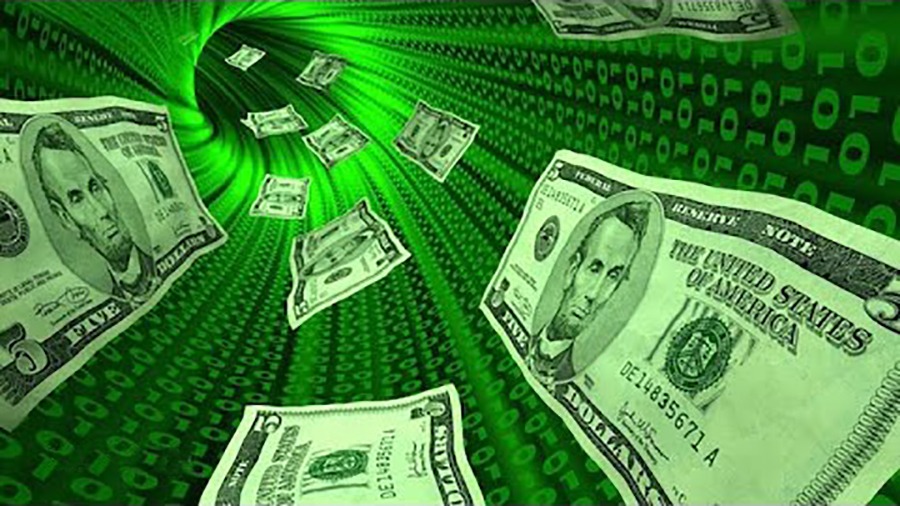
Editor: Vladimir Bajic | Tactical Investor
Cashless Economy
Before we get to the main article we think you might find this article to be of interest.
” The one year chart illustrates that all is well on the surface and that the process of flooding the markets with hot money, in general, is working rather well. The index could drop all the way down to 7200, and the short-term outlook would remain bullish. We are fully aware that this economic recovery is illusory, but complaining and whining about this does not provide one with any extra insights into the markets. We need to focus on what is really going on and how the masses interpret that data.
The truth is irrelevant if only you are aware of it; if the masses think otherwise, what appears as the truth to you could, in fact, be viewed as a lie by the crowd. The truth can set you free, but in most cases, it can be detrimental to your health and wealth; at least as far as the markets are concerned. The longer-term chart illustrates that this index is consolidating. As long as it does not close below 6600 on a monthly basis, the outlook will remain bullish. One could even argue that is its building a base from which it could easily springboard to and past 8400. ” BBC Global 30 Index Signals Dow Industrial Index will trend higher
Debit and credit cards have been part of the financial landscape for decades. The credit card started with the Diners Club card in 1950, while the first debit card pilot program began in 1966. Today, both payment methods are accepted practically everywhere, with the underlying technology evolving to include encrypted EMV chips for faster and more secure transactions.
Then there’s the ongoing shift toward contactless and mobile payments. Many merchants let you pay on your smartphone through Google Pay and Apple Pay with a quick scan. Newer physical cards are also offering contactless payments, requiring you to simply wave the card over the point-of-sale card reader to complete your transaction.
But more and more, the decision to go cashless is made for us when retailers refuse to accept cash in the first place. Shake Shack restaurant mogul Danny Meyer made the switch at a handful of his restaurants in 2018 to improve the safety, efficiency and speed of transactions. Full Story
Dangers of a cashless economy
Nowhere is this more evident than in Asia, home to eight of the ten fastest-growing global markets in mobile payments. While China is leading the way in cashless payments, e-wallets are a global phenomenon that’s set to change the way we live and work. We’re trusting our phones with our money, using selfies to log into our bank accounts, and last year in Sweden, an estimated 4,000 people even went as far as to insert microchips under their skin to have a singular way of accessing their homes, offices, gyms, and even train ticket payment.
“I’m wary of this new phenomenon,” says Stephanie Lee Sy, the CEO and founder of AI company Thinking Machines. “A totally cashless society is a society under total surveillance. It is also a society where your participation in the economy is limited by approval for a bank account or a cell phone plan. I’m in favour of the added convenience of digital payment channels but not to the point of a totally cashless society. Like many other pieces of tech, what’s healthy in small doses turns destructive without a check.” Full Story
Other articles of interest:
Bond Market Today: Fed raised rates & bonds Rallied As Predicted
Sweden Rape News: Police cover up sex crimes
Unapproved Pharmaceutical Ingredients In Dietary Supplements
Market Update Tactical Investor Past Calls: The Trend Is Your Friend
Dow Jones Industrial Average Stocks Soar Slaughtering the Bears
Gold buying Spree Russia & Russian Strength?

China’s corruption crackdown targets both big & small officials
China Corruption: Fast & Furious crackdown
The Big Picture: Lower oil & energy prices
Crude oil price projections: will oil prices stabilize
The Middle Class Squeeze: 4.00 in 1973 equates to 22.41 today
Syria War News: It Is All About Blood, Guns & Money
For Many Americans Great Recession Never Ended
Is VIX pointing to a stock market crash in 2016?
Belt & Road Initiative: Taking China’s culture beyond borders
Negative rates will fuel the biggest Bull Market rally in History (25 May)
Millennials being squeezed out of Housing Market (20 May)
Problem is Fractional Reserve Banking-we don’t need Gold standard (15 May)
BBC Global 30 Index Signals Dow industrial Index will trend higher (11 May)
Stock Market Bull not ready to buckle (4 May)



Reinstituting Silver and Gold as “Money” Implemented by the States http://bit.ly/2fuNFkp
No consent from Congress is necessary.